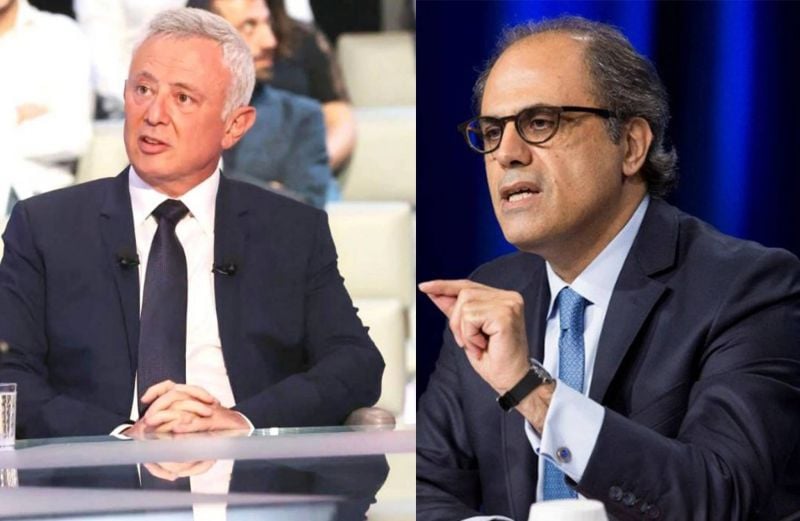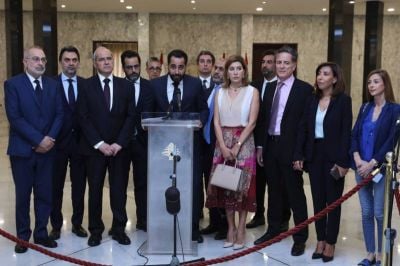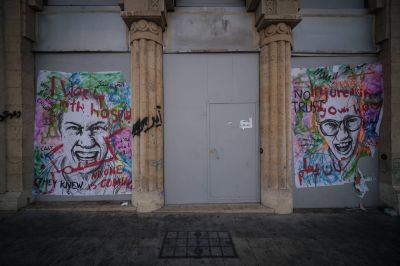
Sleiman Frangieh (left) and Jihad Azour (right). (Credit: Twitter)
BEIRUT — Lebanese MPs and political parties remain divided days before the 12th parliamentary session dedicated to electing the country's next president — not only on the candidates for whom they will vote but also on the potential for the session to succeed in returning a president. Lebanon has been without a head of state since the end of Michel Aoun's term in office on Oct. 31.
Voting on Wednesday is expected to be divided between two candidates. Supporters of the Free Patriotic Movement, the Lebanese Forces, Kataeb, the Progressive Socialist Party, and several independent MPs are backing former Finance Minister Jihad Azour. Hezbollah and Amal Movement have meanwhile endorsed the head of the Marada Movement, Sleiman Frangieh. Several other independents have not yet decided for whom they will cast their ballots.
Parliament Speaker Nabih Berri last week scheduled the 12th parliamentary session to elect a new president for 11 a.m. on Wednesday, June 14.
‘Frangieh does not work according to American instructions’
Hezbollah Deputy Secretary-General Naim Qassem said Sunday that Hezbollah will “participate on Wednesday in the session to elect the president and … will vote for Minister Frangieh.”
Between 1990 and 2005, Frangieh held several ministerial positions.
Qassem pointed out that some of those who reject Frangieh's candidacy state that they don’t have a personal problem with him, but their problem “is that he is with Hezbollah, and this means that some of them have a political problem with him, not because he is with Hezbollah, but rather because Frangieh does … not work according to American instructions, does not sell the blood of martyrs, and does not stab the resistance in the back.”
Qassem added that the latest progress made between the political parties before Wednesday's session, in a clear reference to the agreement by parties opposed to Frangieh's candidacy on supporting Jihad Azour, “did not follow the right path based on a consensus to elect a president on time, and therefore it is difficult for there to be a result” at the end of the session.
Typically, presidents of Lebanon are elected after the country's diverse political parties reach a consensus outside of Parliament, making the parliamentary electoral session a mere rubber stamp on a decision already reached. A decisive showdown between Frangieh and Azour in Parliament on Wednesday may be precluded by either candidate's supporters walking out, and thus scuppering the session's quorum.
Amal MP: We may witness an election of a president Wednesday
Amal Movement MP Qassem Hashem (Hasbaya-Marjayoun) said in an interview with the radio station Voice of Lebanon on Sunday that his party is “working to mobilize votes for Frangieh within a democratic game that allows the session to be lifted after the loss of quorum for the second round.”
"Until now, we don't consider leaving the session before the second round, but the decision may be taken at the moment. Lebanon is a country of surprises, and we may witness the election of a president in this session," Hashem added.
He also criticized the “other party's support for the candidacy of former minister Jihad Azour, who [they] had previously accused of being part of the system that destroyed the country."
FPM: We are not challenging Hezbollah with Azour
Lebanese Forces leader Samir Geagea also commented on the outlook for Wednesday's session, describing it a “pivotal moment.”
“Whoever will cast a white ballot, vote for a name that's not one of the two candidates, or for a slogan, will help the pro-Iran axis to block the presidential election,” he warned.
For his part, FPM MP George Atallah said in an interview with the Voice of Lebanon radio station Sunday that all his bloc's MPs will vote for Azour, whom his party considers a “serious candidate and not a Hezbollah-challenging candidate.”
Atallah's statement comes as the FPM's political council has made it a requirement that all the party's MPs vote for Azour. Observers say that some FPM MPs are opposed to a vote in favor of Azour.
MP Marwan Hamadeh, who is a member of the Democratic Gathering bloc, affiliated with the Progressive Socialist Party, said in a radio interview reported on by the NNA on Sunday that “we did not take Azour as a challenger candidate [as Hezbollah has accused], and we do not consider ourselves challenging anyone.” He added, “If Frangieh succeeds with a clear majority, then he is welcome. In the end, we cannot say no to the democratic game.” Hamadeh, however, warned against the “quorum game, which is unacceptable.”
Hamadeh also warned, "We will not let Bashar al-Assad return to the Baabda palace." Sleiman Frangieh is known to be a good friend of the Syrian president. Hamadeh also alluded to the Syrian occupation of Lebanon, which ended in 2005 after the Cedar Revolution and the withdrawal of the Syrian army from Lebanese territory.
Hope for a democratic session
For his part, Maronite Patriarch Bechara al-Rai said in his Sunday homily in Bkirki that “the Lebanese in Lebanon and abroad, as well as some countries that love Lebanon, are waiting for Wednesday's session.”
“People are expecting the election while official talks unfortunately focus on the loss of quorum, which cancels democracy, deepens the division in the country and makes it fall into deeper crises,” Rai added.
He also expressed his desire that “all parties had abandoned their spirits of challenge, enmities and will to impose their ideas on others” in favor of “national union and fraternity, even if the opinions differ, which is natural.”
During a mass in Saint George Cathedral, the Greek Orthodox Metropolitan of Beirut, Archbishop Elias Audi, expressed hope that the session will lead to the election of a president “that will rescue the country.” He wished for a “quiet and democratic meeting that respects the constitution, without any challenge, blockade or threat.”
All previous sessions — the first of which was held on Sept. 29 — devoted to electing the next head of state have failed to elect a successor to Aoun. To hold a session to elect a president, Parliament requires a quorum of two-thirds of MPs (86 out of 128). To be elected president, a candidate must either win a two-thirds majority in a first-round vote or a simple majority in a second- or subsequent-round vote. Amal and Hezbollah MPs, as well as their allies, had withdrawn from the chamber after the first round of voting in all of the last 11 parliamentary sessions to elect a president, forcing a lack of quorum and thus ending the session. Parliament Speaker Nabih Berri has deemed that for each presidential election session convened, voting be reset to its first-round status.
The country faced a dual executive power vacuum for the first time in its history since the end of Aoun's mandate, with Najib Mikati's cabinet serving only in a caretaker capacity since it assumed the status following legislative elections in May 2022.

